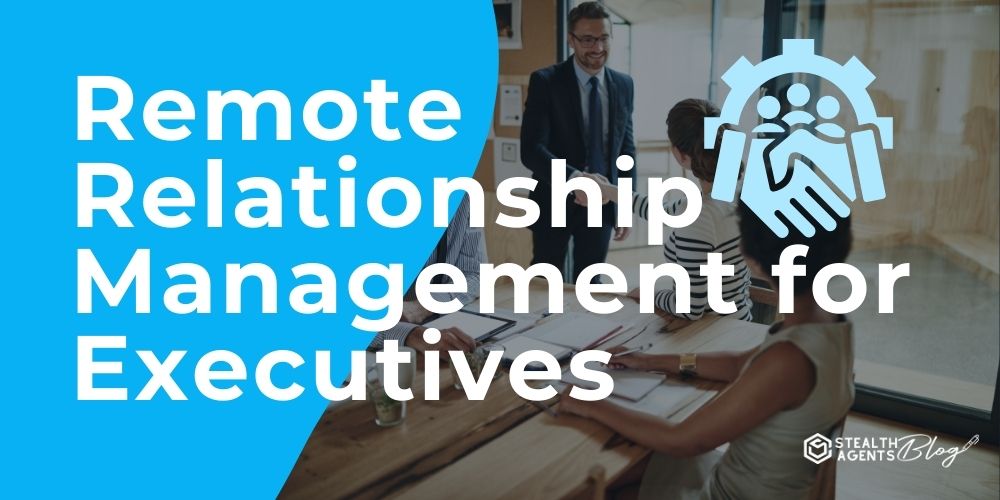Relationship management for executives is made effortless with Stealth Agents who use AI-driven insights and personalized support to keep your key connections strong and timely. This simple, goal-focused approach helps you build lasting professional relationships while freeing up your time to focus on what matters most.
Businesses increasingly recognize the vital roles and skills of remote relationship management for executives.
Consequently, 85% report improved client retention through effective strategies. These executives nurture client relationships and ensure customer satisfaction.
Companies investing in relationship management can increase revenue by up to 25% annually.
Stealth Agents offers tailored solutions, with virtual assistants pricing $15 per hour.
Furthermore, hiring virtual assistants allows businesses flexibility to enhance client interactions efficiently.
As organizations strive for a competitive edge, the strategic contributions of these executives remain crucial.
Who Is A Relationship Management Executive?
A relationship management executive is a professional responsible for maintaining and enhancing a company’s relationships with its clients and partners.
They play a crucial role in understanding client needs and ensuring their satisfaction with the company’s services.
These executives often develop strategies to improve client interaction and communication. Their efforts help in retaining clients and attracting new business opportunities.
Building trust and rapport with clients is a key responsibility of a relationship management executive.
Many companies today hire client engagement virtual assistants to support these executives in their roles.
Tasks are sometimes delegated to a Filipino client support representative to better cater to diverse client bases.
What Is A Relationship Management Executive?
A relationship management executive is a professional responsible for developing and maintaining strong client relationships essential to any business’s success.
They act as the primary point of contact between the company and its clients, ensuring that all client needs and concerns are addressed promptly and effectively.
These executives foster trust and understanding and help create long-lasting partnerships that drive mutual growth.
Their responsibilities include facilitating communication, negotiating terms, and ensuring client satisfaction through tailored solutions.
The role requires communication, negotiation, and problem-solving skills to navigate complex interactions.
Relationship management executives are vital in aligning client objectives with company goals, ultimately contributing to the business’s reputation and profitability.
Their strategic involvement helps identify new opportunities for collaboration and expansion.
Why Hire A Relationship Management Executive?
Hiring a relationship management executive can bring numerous benefits to a business, particularly in enhancing client satisfaction and loyalty.
These professionals specialize in understanding client needs and delivering customized solutions, which leads to increased client retention and repeat business.
With their expertise in communication, relationship management executives ensure clear and consistent dialogue between clients and internal teams, reducing misunderstandings and fostering trust.
They also play a crucial role in negotiating favorable terms aligning with client expectations and business objectives.
By building strong relationships, these executives help the company differentiate itself in a competitive market.
Furthermore, their ability to promptly address and resolve client issues helps maintain a positive reputation.
Hiring a relationship management executive invests in sustainable business growth and success.
What Are The Key Responsibilities Of Relationship Management Executives?
-
Build And Sustain Meaningful Client Relationships
Establishing trust is fundamental to building strong client relationships, as it fosters an environment where clients feel valued and understood.
Regular communication is key, allowing for continuous engagement and the opportunity to address any questions or concerns promptly.
Understanding client needs goes beyond fundamental interactions; it involves actively listening and adapting to their evolving requirements.
Long-term partnerships are nurtured by consistently delivering promises and providing value that aligns with client goals.
Such relationships contribute to business growth by increasing client retention rates and encouraging referrals.
Client loyalty often results from personalized service and attention to detail, strengthening the bond. By prioritizing relationship-building, executives enhance the company’s reputation in the market.
These efforts lead to a sustainable competitive advantage through deep client connections.
-
Serve As The Main Liaison Between Clients And The Company
As the primary contact, relationship management executives play a crucial role in bridging the gap between clients and the organization.
They facilitate the flow of information, ensuring that clients are kept informed about updates, changes, and relevant offerings.
Addressing client concerns promptly is essential for maintaining trust and satisfaction.
Clear communication is vital, as it prevents misunderstandings and reinforces a professional image.
Timely responses to client inquiries demonstrate reliability and commitment to service excellence. By acting as a liaison, executives ensure client feedback is communicated to the appropriate teams, fostering a client-centric approach.
This role also involves coordinating department responses and actions to meet client expectations.
Being the main point of contact strengthens the relationship by showing clients they have a dedicated advocate within the company.
-
Assess Client Needs To Offer Suitable Solutions
The process begins with actively engaging clients to understand their unique requirements and challenges.
This involves asking insightful business relationship-building questions and listening carefully to their responses.
Analyzing the client’s business context helps tailor solutions that align with their strategic objectives.
Executives can address pain points and add significant value by proposing customized solutions.
These solutions often enhance client satisfaction, demonstrating a deep understanding of the client’s business.
Business outcomes are positively impacted when solutions effectively solve problems and improve efficiency.
Providing suitable solutions also helps build credibility and trust with clients, who view the executive as a knowledgeable partner. This process satisfies immediate needs and sets the stage for future collaboration and growth.
-
Ensure Smooth Communication Between Clients And Internal Departments
Coordinating between teams requires a clear understanding of client expectations and internal capabilities.
Managing these expectations involves setting realistic timelines and deliverables that align with client needs.
Ensuring everyone is aligned requires regular updates and practical communication tools.
Challenges such as miscommunication and delays can arise, but proactive management helps minimize these issues. The benefits of effective communication include improved collaboration, higher-quality outputs, and stronger client relationships.
Executives facilitate seamless interactions by acting as a central point of contact, reducing potential errors.
This coordination helps deliver consistent messages and maintain transparency with clients.
Smooth communication results in enhanced client satisfaction and streamlined operations.
-
Oversee Client Satisfaction And Swiftly Handle Any Concerns
Monitoring client feedback is essential for understanding their experience and identifying areas for improvement.
Addressing issues promptly demonstrates a commitment to client care and helps prevent minor issues from escalating.
Implementing improvements based on feedback shows clients that their opinions are valued and acted upon.
This responsibility is crucial for client retention, as satisfied clients are likelier to continue their partnership.
A proactive approach to handling concerns helps maintain a positive reputation and instills confidence in the company’s outsourced customer relationship management services.
Regularly assessing client satisfaction allows executives to avoid potential challenges and adjust strategies accordingly.
By resolving concerns quickly, executives can turn negative experiences into opportunities for strengthening relationships. Overseeing satisfaction is key to fostering trust and loyalty among clients.
What Are The Skills That Relationship Management Executives Must Have?
1. Proficient in communication
Clear communication involves conveying messages straightforwardly and understandably, which helps avoid confusion.
Concise communication ensures that the main points are delivered without unnecessary detail, making it easier for clients to comprehend.
Effective communication in various formats, such as email, phone calls, and meetings, ensures adaptability to client preferences.
Strong communication skills are essential for building relationships and facilitating trust and understanding.
These skills also play a crucial role in conflict resolution, allowing for the smooth negotiation of solutions. By effectively communicating, executives can present ideas persuasively and influence client decisions.
This proficiency supports collaboration within teams and strengthens the overall client experience.
Strong communication skills are foundational to all aspects of relationship management.
2. Skilled in negotiation
Negotiation skills are vital for reaching agreements that satisfy both parties while maintaining solid relationships.
These skills help secure favorable terms that meet client needs and align with company objectives.
Resolving disputes through negotiation requires a balanced approach that considers the interests of all stakeholders.
Successful client interactions often depend on navigating complex discussions and reaching mutually beneficial outcomes. Negotiation also involves understanding the client’s position and finding common ground to achieve desired results.
These skills contribute to building trust, as clients feel their concerns are respected and addressed.
By mastering negotiation, executives can close deals effectively and enhance client loyalty.
Strong negotiation abilities lead to long-lasting partnerships and business success.
3. Adept at problem-solving
The ability to identify issues involves recognizing potential challenges before they become problematic.
Analyzing situations requires critical thinking to understand the root causes and implications of problems.
Developing practical solutions requires creativity and resourcefulness to address issues in innovative ways.
Problem-solving is essential for maintaining client satisfaction and demonstrating a commitment to resolving their concerns.
These skills are crucial for building trust, as clients rely on executives to handle unexpected situations competently.
By proactively addressing problems, executives can prevent client relationships and disruptions in business operations. This capability also supports continuous improvement, encouraging learning from past experiences to enhance future outcomes.
Adept problem-solving contributes to a reputation for reliability and excellence in service delivery.
4. Strong customer service focus
Prioritizing client needs involves understanding their expectations and tailoring services to meet them.
Delivering exceptional service requires going above and beyond to exceed client expectations consistently.
Exceeding expectations consists of anticipating client needs and offering solutions that add value to their business. A strong customer relationship management service focus enhances client relationships by fostering a sense of satisfaction and loyalty.
This orientation supports the development of long-term partnerships by consistently providing high-quality experiences.
Clients who feel valued and understood are likelier to continue their business relationship and recommend services to others.
A commitment to customer service also helps differentiate the company in a competitive market.
Customer relationship management outsourcing drives business growth and success through enhanced client engagement.
5. Capable of managing and resolving conflicts effectively
Handling conflicts requires a calm and composed approach to address disagreements constructively. Mediating disputes involves facilitating discussions between parties to reach a consensus.
Finding amicable solutions requires empathy and active listening to understand different perspectives.
Effective conflict resolution, with the help of a client relationship virtual assistant, is crucial for maintaining positive client relationships by addressing issues before they escalate.
These skills help build trust, as clients feel confident in the executive’s ability to manage difficult situations.
By resolving conflicts effectively, executives can strengthen partnerships and prevent damage to the company’s reputation.
This capability also supports a collaborative environment, encouraging open communication and teamwork.
Strong conflict management skills ultimately contribute to a resilient and harmonious client relationship.
How To Choose The Right Relationship Management Executives For Your Business?
Choosing the right relationship management executives for your business involves assessing several key factors to ensure a successful partnership.
First, evaluate their communication and interpersonal skills, which are crucial for building and maintaining client relationships.
Experience in your industry can also be beneficial, providing context and understanding of specific challenges and opportunities.
Look for candidates with strong customer service orientation, indicating their commitment to client satisfaction.
Cultural fit is another critical consideration, as the executive must align with your company’s values and work well with your team. Additionally, assess their problem-solving abilities and track record of successfully managing client relationships.
Considering these factors, you can select relationship management executives who will effectively represent your business and drive growth.
Why Choose Stealth Agents For Relationship Management Executives?
Choosing Stealth Agents for relationship management executives offers distinct advantages that can elevate your business’s client engagement strategy.
Stealth Agents are known for their expertise in relationship management. They ensure that every client interaction is handled professionally and carefully.
Their client-centric approach means they prioritize understanding and meeting client needs, which enhances satisfaction and loyalty.
With a proven track record in managing diverse client portfolios, they bring valuable experience and insights. Stealth Agents’ commitment to excellence is reflected in their ability to deliver tailored solutions that align with your business objectives.
Their team of relationship management executives is equipped with the skills and knowledge to foster long-term partnerships.
You gain a reliable partner dedicated to supporting your business’s growth and success by choosing Stealth Agents.
Takeaways
Valuable insights have been gained about the importance of relationship management executives in enhancing business operations.
It has been observed that 85% of businesses experience improved client retention with practical management strategies.
The strategic roles played by these executives, including fostering customer loyalty and satisfaction, have been underscored.
Stealth Agents has been highlighted for offering cost-effective solutions. Virtual assistant pricing is $15 per hour.
The crucial impact of relationship management executives on organizational success continues to be recognized.
Keeping strong relationships is important for your business. Stealth Agents can help you manage these connections with ease. Let us save you time so you can focus on what matters. Get started today
Frequently Asked Questions
How can AI help with remote relationship management for executives?
AI helps by giving useful insights, handling simple tasks, and making client interactions more personal. It can study client data to guess what they like and need, helping executives communicate better. AI also helps with scheduling and follow-ups, so executives can focus on building strong relationships.
What tools are important for managing remote relationships?
Important tools include CRM software to track client interactions, communication platforms like Slack or Zoom for staying in touch, and project management tools like Trello or Asana to keep tasks organized. AI tools can also help by analyzing client behavior and giving helpful suggestions.
How is remote relationship management different across industries?
Different industries have different ways of managing relationships. For example, the tech industry may prefer quick online chats, while healthcare might focus on detailed and caring conversations. Knowing these differences helps executives connect better with their clients.
What challenges do executives face in remote relationship management?
Challenges include dealing with time zone differences, building trust without meeting in person, and handling different client needs. Executives also need to keep up with new technology and make sure client data stays safe. Solving these problems takes good tools and a flexible approach.
How can executives check if their remote relationship management is working?
Executives can check success by looking at how many clients stay with them, how happy clients are, and how often clients come back. They can also track things like how quickly they respond to messages and how many meetings clients attend. These numbers show what’s working and what needs fixing.
What do virtual assistants do in remote relationship management?
Virtual assistants help by taking care of simple tasks like scheduling, entering data, and talking to clients first. This gives executives more time to focus on important relationships. Virtual assistants also share updates and useful information to help executives make quick decisions.
How do cultural differences affect remote relationship management?
Cultural differences can change how people communicate, make decisions, and what they expect. Executives need to understand and respect these differences. This includes using the right communication style, knowing about cultural holidays, and being careful with language.
What are the benefits of using analytics in remote relationship management?
Analytics help by showing what clients like and need. This helps executives plan better and connect with clients in a way that feels personal. By studying data, executives can spot trends, guess what clients might want next, and improve how they communicate.
How can technology make client engagement better in remote relationship management?
Technology helps by making it easy to talk to clients through different channels and by personalizing interactions. Tools like CRM systems and AI can track what clients like and need, so executives can send messages that feel timely and relevant. This builds trust and keeps clients happy.
What future trends might we see in remote relationship management?
In the future, AI might be used more to guess what clients want and make interactions even more personal. Virtual and augmented reality could be used for more interactive meetings. Businesses may also use more ways to communicate with clients and focus on keeping data safe to build trust.









